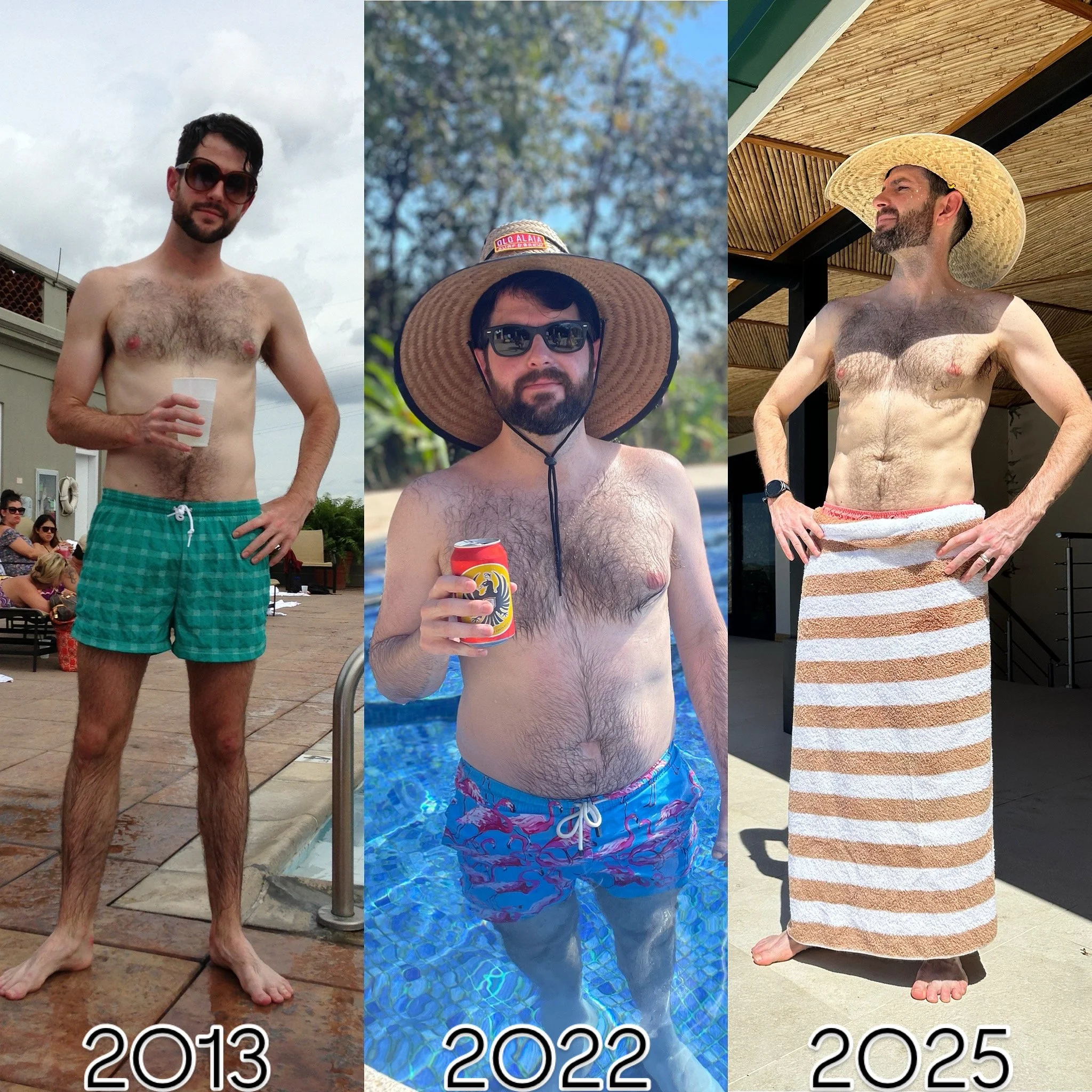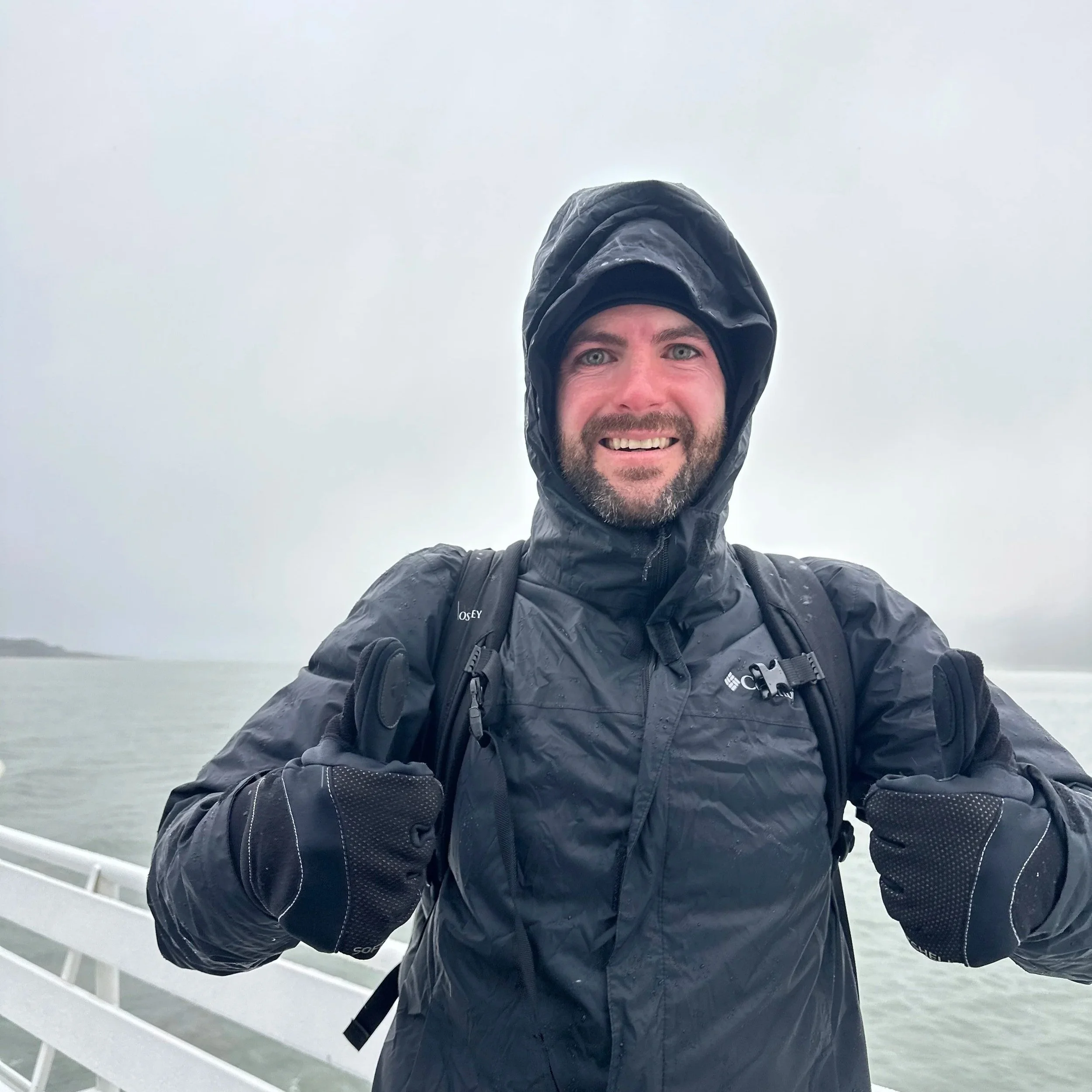
Feel Good Now… and for the long run*
*Running not required
Hello and welcome to
The Long Run!
My Journey (in 3 photos)
These three photos tell my story better than words (but please keep reading!).
2013:
Lean, under-muscled. Mostly just running. OK sleep. “What’s protein?”
2022:
Less lean. Maybe more muscle. Lots of Peloton. Poor sleep. Unbalanced nutrition. Frustrated.
2025:
Lean again, with more muscle (especially legs — trust me). Running, Peloton, lifting. Better sleep. Balanced nutrition. Feeling good.
So… Are you a busy human who is at least a little overwhelmed or confused by health advice?
I know I was. Well, you’re in the right place.
My name is Robby Nelson. (Hi!)
Based in Brooklyn (originally Albuquerque, NM)
NASM-certified personal trainer
Health & longevity coach
Incapable of taking a normal picture
I sold alcohol for 13 years — bartender, bar manager, then liquor rep.
I used to drink more.
Now I drink less.
And thanks to some hard work and some very simple changes, I feel better than I have in years.
I didn’t give up life to get healthy.
I learned how to make health fit into my life.
That’s what I want for you! Let’s talk!
Services
Let's connect for 30 minutes or less on a phone or video call so I can learn more about your health and longevity goals!
I will also share my coaching philosophy to ensure we’re a good fit.
If you want to move forward, I will send you an onboarding questionnaire so that I have the best understanding of your current health and wellness so we can hit the ground running.
Why virtual?
Because your time is valuable and so that I can work with you wherever you are.
I will review your questionnaire to prepare my initial thoughts and plan for you, which we will then discuss in our first 60-min video call.
After the session, I will send you a recap and a personalized Performance Plan, which will include recommendations for your sleep, nutrition, movement, and ways to track and improve your health to feel better now and for the long run.
We’ll continue to connect virtually weekly or monthly, based on your preferences, to continue refining the plan.
Do you have a race coming up?
Or maybe you’re looking for an accessible form of aerobic movement you can do virtually anywhere?
Or maybe you made a bet with your best friend about who can run the fastest 5k?
As a former competitive distance runner in college and as a serious amateur for several years after college, I understand how to help you achieve your short-term and long-term running goals, while staying strong and injury-free. Available as an add-on service.
What people are saying
Let’s Connect!
Ready to take the next step toward reaching your goals? Schedule a session with me and start your journey towards long-term health and fitness today.
I was born in 1986, which means I'm however old that makes me whenever you're reading this. But as I’ve come to learn, calendar age doesn’t tell the full story.
Like many of you, I’ve been on a health journey—certainly over the past few years but also, in many ways, my entire life. The exciting part? I feel younger now than I have in over a decade.
And no, it’s not because of a pill or some expensive, futuristic treatment (more on my views about that later). It’s because I spent the time and energy to study my body, reflect on what truly supports health, and build a more holistic, sustainable approach to feeling good—now and for the long run.
Speaking of long runs, I was lucky to discover running early. In ninth grade, after missing the basketball team the year before, I joined the cross country team to get in shape—and I never looked back.
Running became a lifelong passion that forged many of my closest friendships and continues to bring me joy. But my relationship with running hasn’t always been smooth.
Like many runners, I fell into the trap of only running—ignoring strength, mobility, stability, and power. That approach eventually caught up with me.
Early in the COVID pandemic, I developed sciatica. I had stopped bartending, started selling alcohol, and gained 30–40 pounds (and not of muscle)—mostly from poor sleep, stress, and focusing too much on carbohydrates at the expense of protein. (Turns out, much to my continued dismay, that martinis don’t pair well with restorative sleep, especially close to bedtime.)
Fortunately, I had both time and a bit of anatomical knowledge (from my brief time studying physical therapy) to self-assess and rebuild. I discovered the root of my sciatica was weak and inactive glutes—something strength training began to address. While I’d never loved lifting weights, I started incorporating strength, mobility, and stability work into most days—and the results were undeniable.
But something still didn’t feel right. I was exercising regularly and intensely—especially once I became a devoted Peloton rider during my injury recovery—but I wasn’t happy with my body composition. I was heavier than I wanted to be and assumed, like many, that it was just part of being in my 30s.
I was wrong.
Despite my dedication, I was unknowingly compromising my metabolic health: over-prioritizing carbohydrates, under-consuming protein, and continuing to miss out on high-quality sleep.
Over time, I began to shift course. I made small, science-backed adjustments—dialing in my nutrition, focusing on sleep, managing stress, and training smarter (and harder).
Sleep, by the way, is not just important—it’s foundational. Deep sleep helps regulate blood sugar, manage stress hormones, support testosterone production, and consolidate long-term memory. It’s where recovery actually happens.
And while I had always prioritized sleep quantity (thank goodness), I didn’t realize that my sleep quality was suffering, largely as a result of too much alcohol too close to bedtime.
Now, I feel as good—or better—than I did a decade ago. Regular checkups and blood work also back that up. I still have areas I’m working on (who doesn’t?!), but I feel confident that I’m setting myself up for success for the long run, and I’d love to help you too!
A bit about me…

Contact Me
Interested in working together? Have a few questions? Fill out this form and I will be in touch shortly. I can’t wait to hear from you!






